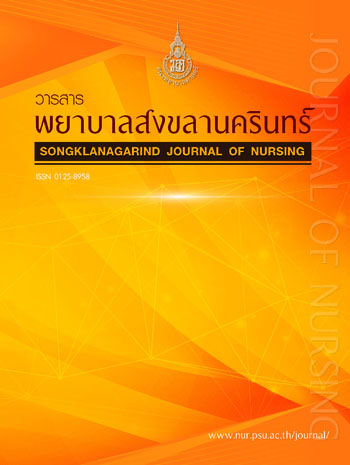Effects of Competencies Developing Program for Nurses in Promoting, Supporting, and Protecting Breastfeeding in Southern Thailand
Main Article Content
Abstract
This quasai experimental research, one group pretest-posttest design, aimed nurses to compare nurses
competencies in promoting, supporting, and protecting breastfeeding before and after received the competencies
developing program. And to investigate problems and barriers in promoting, supporting, and protecting breastfeeding
of the nurses. The samples were 30 nurses. The instruments were the competencies open-ended developing program
for nurses. The competencies in promoting, supporting, and protecting breastfeeding questionnaire; qualitative
and the guidelines for developing. All instruments were tested for content validity by 3 experts. Reliability of the
competencies in promoting, supporting, and protecting breastfeeding questionnaire was tested for reliabity
questionnaire (Validity = 0.90) Descriptive statistics, paired t-test, and content analysis were used for data analysis.
The results showed that the mean score of the total nurses’ competencies in promoting, supporting,
and protecting breastfeeding after nurses received the competencies developing program was non statistical
significantly higher than before receiving the program (t = 1.908, p > 0.05). However, the mean score of
nurses’ competencies in aspects (basic knowledge of breastfeeding policy and promoting breastfeeding during
pregnancy period) received the was statistical significantly higher before nurses received the program
(t = 2.225, p < 0.05 and t = 2.423, p < 0.05, respectively). The content analysis results on problems and barriers
in promoting, supporting, and protecting breastfeeding were nurses’ work load, nurses’ attitude.
This competencies developing program for nurses can be applied to promoting, supporting, and protecting
breastfeeding among nurses. Suggestion to improve other aspects in this program in order to make it overcome
the problems and barriers in promoting, supporting, and protecting breastfeeding are discussed.


